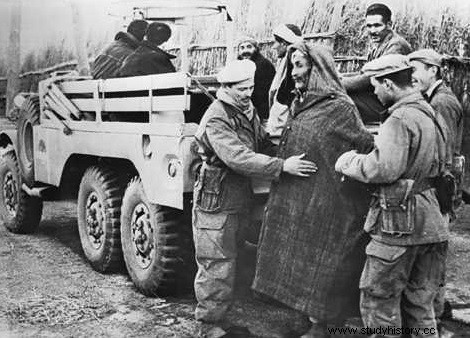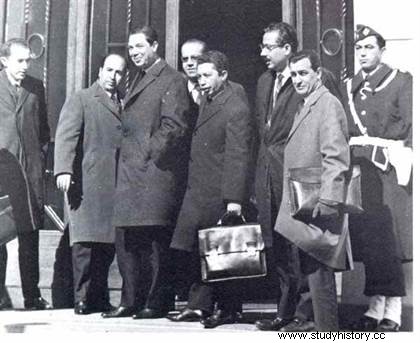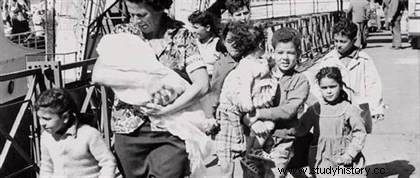 Theindependence of Algeria was proclaimed on July 5, 1962 , at the end of a very violent conflict of almost eight years, and especially more than a century of colonial occupation. On March 19, 1962, the Évian agreements had put an end to the fighting and on July 1, a referendum allowed Algeria to choose independence, with most Europeans then leaving the country. The War in Algeria , which for a long time never bore this name, left deep scars within the populations concerned, on both sides of the Mediterranean, with consequences that are still felt today. Independence itself, and the conditions under which it was achieved, have also had an impact on the Algeria of today.
Theindependence of Algeria was proclaimed on July 5, 1962 , at the end of a very violent conflict of almost eight years, and especially more than a century of colonial occupation. On March 19, 1962, the Évian agreements had put an end to the fighting and on July 1, a referendum allowed Algeria to choose independence, with most Europeans then leaving the country. The War in Algeria , which for a long time never bore this name, left deep scars within the populations concerned, on both sides of the Mediterranean, with consequences that are still felt today. Independence itself, and the conditions under which it was achieved, have also had an impact on the Algeria of today.
Seven years of war in Algeria
Algeria has been a colony of the French Empire since 1830. After the Second World War, its demands for independence became more pressing with the French government, which refuses any idea of independence. While France is trying to settle the Tunisian and Moroccan issues, the situation deteriorates sharply in Algeria on November 1, 1954. The National Liberation Front recently created by Ahmed Ben Bella organizes a series of attacks that kill eight people. These "Red All Saints' attacks" mark the beginning of the Algerian insurrection which soon spread to all of Constantine and Kabylia. The French government reacted promptly by sending military reinforcements and repressive measures. Jacques Soustelle is appointed Governor General. The desire for independence on the one hand and remaining in the French Union on the other are irreconcilable and Algeria is sinking into an infernal spiral of attacks and repression.
 This commitment to total war, which in May led to the resignation of Mendès France, amounted to leaving armed with a growing independence which it uses for the most diverse ends. Because pacification has many faces. Supervised by the officers of the Specialized Administrative Sections, an immense effort is made to protect, educate, occupy and care for the Algerian populations so long neglected by the civil power. While the contingent proceeded to patrol the bled and the construction of electrified dams on the Moroccan and Tunisian borders was undertaken, in order to deprive the rebellion of its external supplies, the army carried out brutal combing operations, the regrouping of the populations in camps, to the "intensive" interrogation of suspects. Totally overwhelmed, the civil authority came to cover all forms of repression, just as it covered the initiative of certain military leaders who, on October 22, 1956, boarded the plane transporting, from Morocco to Tunisia , leaders of the F.L.N., including Ahmed Ben Bella.
This commitment to total war, which in May led to the resignation of Mendès France, amounted to leaving armed with a growing independence which it uses for the most diverse ends. Because pacification has many faces. Supervised by the officers of the Specialized Administrative Sections, an immense effort is made to protect, educate, occupy and care for the Algerian populations so long neglected by the civil power. While the contingent proceeded to patrol the bled and the construction of electrified dams on the Moroccan and Tunisian borders was undertaken, in order to deprive the rebellion of its external supplies, the army carried out brutal combing operations, the regrouping of the populations in camps, to the "intensive" interrogation of suspects. Totally overwhelmed, the civil authority came to cover all forms of repression, just as it covered the initiative of certain military leaders who, on October 22, 1956, boarded the plane transporting, from Morocco to Tunisia , leaders of the F.L.N., including Ahmed Ben Bella.
At the beginning of 1957, the French army was massively engaged in the conflict, and during the “Battle of Algiers” did not hesitate to resort to torture to put the networks of the FLN out of harm's way. In France, the ministerial crisis is added to the insurrectional situation which reigns in Algiers, and causes the return of General de Gaulle to power. Ambiguous on the Algerian question, the latter opened the way in September 1959 to a process of self-determination, formalized by a referendum on January 8, 1961. On May 20, talks opened in Evian with the FLN.
Évian Accords and independence of Algeria
 There is still debate today to determine the effective end of the Algerian war. In France, it is the Evian agreements, signed on March 18, 1962, and followed by a ceasefire (all relative), which are supposed to mark it. But these negotiations are disputed, both on the French side and on the Algerian side, and the situation escalates again. The French of Algeria (the black feet) begin to leave the country, the OAS implements a scorched earth policy, the harkis are abandoned, and the Algerian separatists tear themselves apart despite their victory.
There is still debate today to determine the effective end of the Algerian war. In France, it is the Evian agreements, signed on March 18, 1962, and followed by a ceasefire (all relative), which are supposed to mark it. But these negotiations are disputed, both on the French side and on the Algerian side, and the situation escalates again. The French of Algeria (the black feet) begin to leave the country, the OAS implements a scorched earth policy, the harkis are abandoned, and the Algerian separatists tear themselves apart despite their victory.
The Algerian signatories of the Evian agreements are far from unanimous within the nationalist movement, already divided by the FLN / MNA rivalries in previous years. The Tripoli Congress of May-June 1962, despite a final agreement, brought to light the rivalries that were eating away at the FLN. The latter obtained primacy over the GPRA, which signed the Evian agreements, which did not calm a real war between factions. It took an alliance between Boumediene and Ben Bella for the situation to finally stabilize...in September 1962.
 Meanwhile, despite the tensions between Algerians and the terrorist actions of the OAS, a referendum is organized in Algeria July 1, 1962, and the "yes" to independence wins by more than 99%. The results were recorded on July 3 by General de Gaulle, and independence was proclaimed two days later, on July 5, 1962. A more than symbolic date since the beginning of the colonization of Algeria was generally linked to the taking of Algiers, July 5, 1830. Throughout the country, it is popular jubilation, to celebrate independence but also the end of violence. The people shout "Seven years is enough!" », and yet the violence among the Algerians resumed between nationalists, at the end of August, and therefore only ended in September, with the Boumediene/Ben Bella agreements.
Meanwhile, despite the tensions between Algerians and the terrorist actions of the OAS, a referendum is organized in Algeria July 1, 1962, and the "yes" to independence wins by more than 99%. The results were recorded on July 3 by General de Gaulle, and independence was proclaimed two days later, on July 5, 1962. A more than symbolic date since the beginning of the colonization of Algeria was generally linked to the taking of Algiers, July 5, 1830. Throughout the country, it is popular jubilation, to celebrate independence but also the end of violence. The people shout "Seven years is enough!" », and yet the violence among the Algerians resumed between nationalists, at the end of August, and therefore only ended in September, with the Boumediene/Ben Bella agreements.
July 5, 1962:the Oran massacre
Sign of the particular conditions of this peace and this independence, the very day of the acquisition of its freedom by the Algerian people, takes place in Oran the massacre of a hundred people, not to mention several thousand missing who will not all be found in the following weeks. As the Algerian crowd reached the European quarters, shots broke out (some evoke a provocation by the OAS), and a hunt began against the French still present. The French army does not intervene, and the survivors evoke scenes of torture, looting and kidnappings.
 The next day, the FLN restored the situation, and on July 12 Ben Bella entered Oran. As often in this kind of event (like Sétif and Guelma on May 8, 1945), the final toll is very variable depending on the sources, between more than a hundred victims, and thousands following the numerous disappearances this day and the following. Be that as it may, the Oran massacre accelerated the departure of the French from Algeria to the metropolis.
The next day, the FLN restored the situation, and on July 12 Ben Bella entered Oran. As often in this kind of event (like Sétif and Guelma on May 8, 1945), the final toll is very variable depending on the sources, between more than a hundred victims, and thousands following the numerous disappearances this day and the following. Be that as it may, the Oran massacre accelerated the departure of the French from Algeria to the metropolis.
This episode, often overshadowed like other dramas of the same order during this conflict (as October 17, 1961 was for a long time, for example), is however symptomatic of the conditions of independence, and especially of its painful consequences on the populations on both sides of the Mediterranean. While the FLN must, following its victory, (re)build the country, the long work of history and memory has only just begun, and is far from over, fifty years after the independence of Algeria.
Bibliography
- B. Stora, History of the Algerian War, La Découverte, 2004.
- S. Thénault, Algeria:from “events” to war:received ideas about the Algerian war of independence, Le Cavalier Bleu, 2012.
- Jean-Jacques Jordi, Algeria:From war to independence 1957-1962. Editions Ouest-France, 2012
